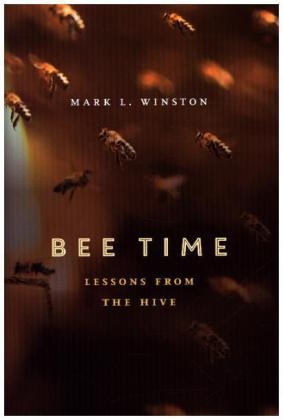
Bee Time
Lessons from the Hive
Seiten
2014
Harvard University Press (Verlag)
978-0-674-36839-2 (ISBN)
Harvard University Press (Verlag)
978-0-674-36839-2 (ISBN)
- Titel ist leider vergriffen;
keine Neuauflage - Artikel merken
Being among bees is a full-body experience, Mark Winston writes. Bee Time presents his reflections on three decades spent studying these remarkable creatures, and on the lessons they can teach about how humans might better interact with one another and the natural world, from the boardroom to urban design to agricultural ecosystems.
Being among bees is a full-body experience, Mark Winston writes—from the low hum of tens of thousands of insects and the pungent smell of honey and beeswax, to the sight of workers flying back and forth between flowers and the hive. The experience of an apiary slows our sense of time, heightens our awareness, and inspires awe. Bee Time presents Winston’s reflections on three decades spent studying these creatures, and on the lessons they can teach about how humans might better interact with one another and the natural world.
Like us, honeybees represent a pinnacle of animal sociality. How they submerge individual needs into the colony collective provides a lens through which to ponder human societies. Winston explains how bees process information, structure work, and communicate, and examines how corporate boardrooms are using bee societies as a model to improve collaboration. He investigates how bees have altered our understanding of agricultural ecosystems and how urban planners are looking to bees in designing more nature-friendly cities.
The relationship between bees and people has not always been benign. Bee populations are diminishing due to human impact, and we cannot afford to ignore what the demise of bees tells us about our own tenuous affiliation with nature. Toxic interactions between pesticides and bee diseases have been particularly harmful, foreshadowing similar effects of pesticides on human health. There is much to learn from bees in how they respond to these challenges. In sustaining their societies, bees teach us ways to sustain our own.
Being among bees is a full-body experience, Mark Winston writes—from the low hum of tens of thousands of insects and the pungent smell of honey and beeswax, to the sight of workers flying back and forth between flowers and the hive. The experience of an apiary slows our sense of time, heightens our awareness, and inspires awe. Bee Time presents Winston’s reflections on three decades spent studying these creatures, and on the lessons they can teach about how humans might better interact with one another and the natural world.
Like us, honeybees represent a pinnacle of animal sociality. How they submerge individual needs into the colony collective provides a lens through which to ponder human societies. Winston explains how bees process information, structure work, and communicate, and examines how corporate boardrooms are using bee societies as a model to improve collaboration. He investigates how bees have altered our understanding of agricultural ecosystems and how urban planners are looking to bees in designing more nature-friendly cities.
The relationship between bees and people has not always been benign. Bee populations are diminishing due to human impact, and we cannot afford to ignore what the demise of bees tells us about our own tenuous affiliation with nature. Toxic interactions between pesticides and bee diseases have been particularly harmful, foreshadowing similar effects of pesticides on human health. There is much to learn from bees in how they respond to these challenges. In sustaining their societies, bees teach us ways to sustain our own.
Mark L. Winston is Professor and Senior Fellow at Simon Fraser University’s Centre for Dialogue and Professor in the Department of Biological Sciences.
| Verlagsort | Cambridge, Mass |
|---|---|
| Sprache | englisch |
| Maße | 140 x 210 mm |
| Themenwelt | Sachbuch/Ratgeber ► Natur / Technik ► Naturführer |
| Naturwissenschaften ► Biologie ► Ökologie / Naturschutz | |
| Naturwissenschaften ► Biologie ► Zoologie | |
| ISBN-10 | 0-674-36839-8 / 0674368398 |
| ISBN-13 | 978-0-674-36839-2 / 9780674368392 |
| Zustand | Neuware |
| Haben Sie eine Frage zum Produkt? |
Mehr entdecken
aus dem Bereich
aus dem Bereich
Buch | Hardcover (2019)
Quelle & Meyer (Verlag)
39,95 €
Botanik, Ethnopharmakologie und Anwendung
Buch | Hardcover (2022)
at Verlag
139,00 €


